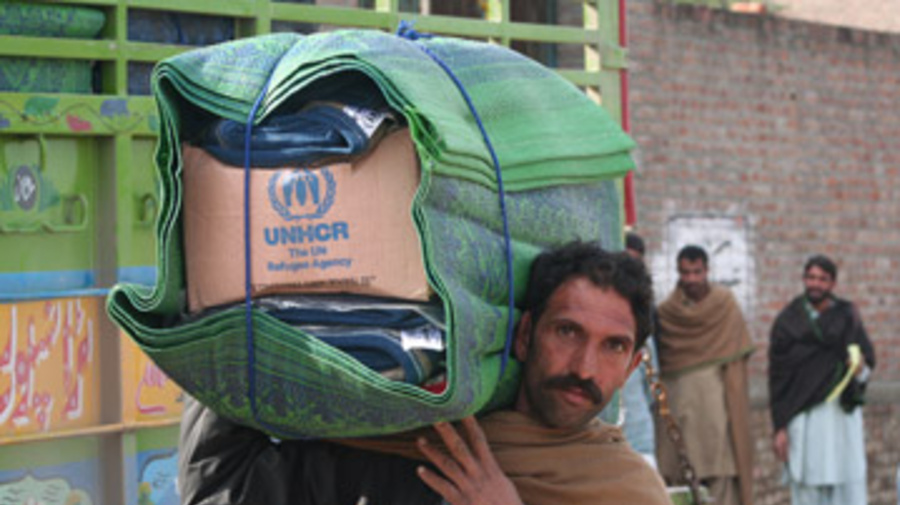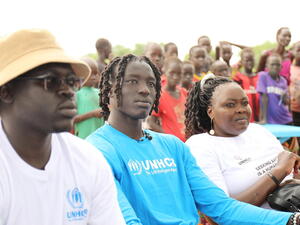Jalozai camp population swells as Pakistan's displacement crisis deepens
Jalozai camp population swells as Pakistan's displacement crisis deepens

An internally displaced Pakistani man carries away a package of UNHCR aid.
PESHAWAR, Pakistan, February 11 (UNHCR) - More than 100 families, or about 500 people, are seeking shelter in Pakistan's Jalozai camp every day as pressure mounts on those already displaced amid continuing fighting in the country's northern highland regions.
When fighting began last August in Bajaur agency of the Federally Administered Tribal Areas (FATA), some 260,000 people initially moved to safer areas in the North West Frontier Province (NWFP).
But with conflict escalating in NWFP's Swat district and other parts of the FATA, latest estimates put the number of displaced at around 450,000. That figure includes people made homeless by floods in August. The UN believes that the number could top the 600,000 mark within weeks.
The region is already among the poorest areas of Pakistan, but the escalating fighting and the general economic crisis, which has seen food prices rise 22 percent, is putting immense strain on the resources of the displaced and host communities alike. While most families flee to urban areas, renting accommodation or staying with relatives, more and more people, such as 56-year-old farmer Nauman,* are now moving into camps as their reserves run low.
Nauman* and his family of 14 fled their home in Mohmand Agency two months ago to escape the escalating fighting between government forces and militants. They took a house in the town of Mardan, but Nauman can no longer afford the rent and has asked reluctantly to be registered in Jalozai camp, where the UN refugee agency is now assisting Pakistan's internally displaced.
He has no idea how long they might have to stay. "It will depend on the situation at home," Nauman said. "I don't know if I can find work here in the Peshawar district until it is safe to go home."
Ali* and his internally displaced family of 11 have also just been registered at Jalozai camp, after two months staying with relatives in Mardan. "We are compelled to live here [in Jalozai]," the 39-year-old from Mohmand Agency said. "We cannot stay with our relatives any more. They are also 11 people, and have only a one-room house."
Meanwhile, as UNHCR works to expand the capacity of camps like Jalozai to cope with the fresh influx, the agency has also stepped up distribution of basic relief supplies to help people living outside the camps - where 80 percent of registered internally displaced Pakistanis reside - as part of a broader coordinated humanitarian effort.
The agency has already assisted more than 8,000 families with items such as sleeping mats, blankets and kitchen sets in the Mardan, Nowshera, Swabi, Lower Dir, Upper Dir and Kohat districts.
Zarsanga, from the volatile Swat district, was delighted to receive relief items from UNHCR. The 44-year-old and her seven children are living with a local family in Mardan after fleeing their home. In return for shelter, Zarsanga does housework for her hosts while her husband has moved to Pakistan's lowland Punjab province to find work.
"How long can we depend on others to feed us?" Zarsanga asked. "Now that I have my own things, I can return the utensils which have been given to us by the hosts. They have been very kind to us," she added.
Kilian Kleinschmidt, UNHCR's assistant representative in Pakistan, said that although distribution of basic relief items was under way, the agency recognized that people needed much more help.
"The humanitarian community as a whole, in collaboration with the government of Pakistan, needs to expand the range of assistance we can provide, so people can rent houses, restart livelihoods and access services. They need to regain their dignity," he stressed.
More than 64,500 people in 12 camps in NWFP have now been registered by the government of Pakistan, with help from UNHCR, an increase of around 15,000 from the previous month. Another 245,000 people living outside camps have been registered, while many more are expected to be registered in weeks to come.
The registration of a significant portion of displaced people has been a critical step in management of the crisis. "Registration is always a complex task, but we now have much better information to plan and distribute the assistance required," said Kleinschmidt.
Registration of displaced people in the cities of Karachi, Islamabad/Rawalpindi and Lahore will start soon. As part of a broad UN appeal to donors, UNHCR is seeking a further US$16.8 million to step up assistance to Pakistan's uprooted people. The overall UN appeal, launched last week, is seeking an additional US$98 million.
* Names changed for protection reasons
By Ariane Rummery and Rabia Ali in Peshawar, Pakistan









